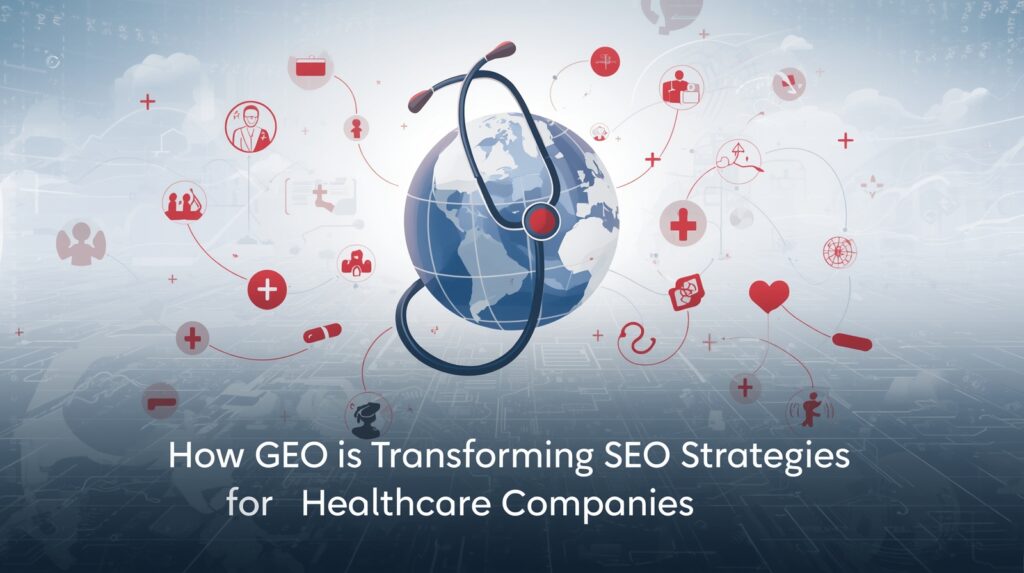
healthcare seo services
SEO has been an important part of getting clinics, hospitals, and medical practices to show up online for a long time. People looking for medical help look for symptoms, doctors, treatment options, and more. But in the last year or two, things have started to change. A new layer of search is coming up with the rise of generative AI tools. Healthcare companies now need to think about digital visibility in terms of Generative Engine Optimization (GEO).
This article talks about what GEO is, why it matters, especially in healthcare, and how healthcare companies can update their SEO playbook, including healthcare SEO services, to stay helpful, trustworthy, and visible in 2025 and beyond.
What Is GEO (Generative Engine Optimization)?
Generative Engine Optimization (GEO) is the process of making content easier for AI-powered tools like ChatGPT, Google’s SGE (Search Generative Experience), Perplexity, and other generative engines to find, understand, and use in their responses. GEO doesn’t just want your page to show up in regular search results; it also wants your content to be cited or referenced when people ask questions in AI systems.
Some important parts of GEO are
Clear structure: headings, FAQ sections, and bullet lists that are easy to read
Trust and authority: using reliable sources, medical citations, and following the rules
Semantic completeness means answering questions completely and correctly.
Consistent information: the names of the clinics, the services they offer, and their contact information all match up.
This is especially important in healthcare: the content needs to be not only well-optimized but also medically accurate and compliant, since wrong or misleading medical information can have serious effects.
Why GEO Matters for Healthcare Companies in 2025
Several shifts make GEO particularly relevant now:
- Increase in search behavior based on AI
Patients don’t just type in keywords anymore; they ask full questions like “What are the first signs of type 2 diabetes?” and “Which clinic near me offers telehealth psychiatry?” People are using AI tools to answer these questions. You lose visibility if your clinic isn’t one of those answers. - Trust and safety needs
Healthcare is a “Your Money, Your Life” (YMYL) type. Here, accuracy, sources, and credentials are more important than in many other areas. AI tools tend to like content that has strong signals of reputation. Being left out or misquoted can hurt both your brand and your patients. - Search engines are changing
Google and other search engines are adding generative AI layers, like SGE and AI Overviews. These layers might show summaries, answer boxes, or conversational responses, often without the user having to click on a lot of links. GEO becomes a way to get involved in those new areas. - Competitive advantage for clinics and medical practices
Practices that change early can get trust, visibility, and patient questions before their competitors do. AI tools might point to the clinic with the right content structure and trustworthiness if two clinics serve similar patients.
How GEO Differs from Traditional SEO (and How They Complement Each Other)
While traditional SEO remains relevant, GEO shifts priorities. It doesn’t replace SEO—but changes what matters in many SEO strategies.
| Traditional SEO Focus | GEO-Focused Additions |
|---|---|
| Keywords, backlinks, PageRank | Clear answers, semantically rich content, citations, reputation |
| Ranking in SERPs & traffic generation | Getting cited in AI-generated answers & summaries |
| Link building & meta tags | Structured data (schema), entity optimization, content clarity |
| Title tags & meta descriptions | Consistency of service details across all platforms, authority signals |
Healthcare SEO services that don’t pay attention to GEO may not get as much business as AI-generated content becomes more important. The two work best together: strong traditional SEO sets the stage, and GEO adds visibility where AI search lives.
Keys to Effective GEO for Healthcare Companies
To implement GEO successfully in the healthcare sector, certain elements are especially important:
1. Precision in language and content
-
Use plain, clear, medically accurate descriptions. Avoid vague terms.
-
Address specific questions patients ask: symptoms, treatment windows, costs, telehealth, and insurance issues.
-
Include FAQs, “What to expect” sections, and patient stories to build authenticity.
2. Structured data & schema markup
-
Use medical schemas, etc.
-
Mark up FAQs, services, location, and hours so AI can extract information easily.
-
Consistency across site for contact info (NAP: name, address, phone), operating hours, etc.
3. Reputation & trust signals
-
Accumulate patient reviews and citations in trusted sites or directories.
-
Ensure authorship or content contributors are credible or medically trained.
-
Provide sources for medical claims; link to guidelines and peer-reviewed studies.
4. Technical clarity, speed, and accessibility
-
Site speed and mobile optimization still matter. AI systems may favor sources that meet basic usability.
-
Clean layout: headings, bullet points, short paragraphs.
-
Accessibility: clear images, alt text, readable fonts, and properly labeled content.
5. Monitoring and adapting
-
Use tools to see how content may be cited by AI search tools.
-
Track branded search queries and mentions across platforms.
-
Adjust your content strategy based on feedback: patient language and new tools.
Applying GEO into Your Healthcare SEO Services Strategy
If your organization offers healthcare SEO services or you are managing one, here are practical steps to incorporate GEO into your strategy:
- Check your current content to find pages that are doing well in search engines but aren’t being used by AI tools. Add structured data, FAQs, and longer answers to those.
- Make new content that AI can pull out, like question-and-answer pages, symptom checkers, and service explainers that answer patients’ questions.
- Make sure that the same clinic address, service names, and phone numbers are used on your website, in directory listings, and on social media.
- Make sure your content is reliable by getting input from medical professionals, using citations, and following medical rules and standards.
- Include GEO in your services: clients want more than just basic SEO. Offering GEO-optimized content (schema, entity optimization, and answer-first content) will make your service stand out.
Challenges & Ethical Considerations
Transforming your strategy to adopt GEO isn’t without difficulties, especially in healthcare:
-
Medical misinformation risk: When AI pulls from less reliable sources, misleading or incorrect answers can propagate. You must ensure accuracy and peer-reviewed sourcing.
-
Regulatory & compliance limits: Health content is often regulated by local laws. Content must respect privacy laws (HIPAA or equivalents), disclaimers, etc.
-
Measurement difficulty: AI-generated answers may not produce the same kind of traffic metrics SEO used to rely on. You may not see clicks, but you might see indirect benefits: more patient calls, mentions, and brand searches.
-
Resource requirements: Producing high-quality, medically accurate content, maintaining structure and consistent data, and performing schema markup take time and expertise.
Case Study / Example
Here’s a fictional but realistic example to illustrate how GEO can help:
HealthFirst Clinic is a medium-sized clinic for outpatients. Before GEO, they used standard healthcare SEO services like blogs that were optimized for keywords, local SEO, and fast site speed. They check their content in early 2025 and find that many service pages don’t have FAQs or structured schema. They add detailed FAQs to pages, use schema markup, make sure that NAP is the same in all listings, add citations to medical guidelines, and ask happy patients to leave reviews that mention specific services. HealthFirst starts showing up in AI-generated answer summaries for questions like “walk-in urgent care in [City]” or “best clinic for dermatology near me” within a few months. They get more calls from patients, more requests for appointments through their website, and their brand starts to show up in local AI-overview tools.
What To Expect Moving Forward
By adopting GEO, healthcare companies can anticipate several shifts:
- More direct mentions in AI tools—patients might find you without having to click on links.
- More trust and credibility for the brand.
- Change in content strategy: more focus on content that starts with a question and ends with an answer.
- More need for accurate, current medical information on all pages.
- Voice search, AI assistant referrals, and AI summaries with recommendations are all new ways to get patients.
Conclusion
GEO is changing how healthcare companies need to think about being seen. Traditional SEO is still important, but as more and more patients use AI-powered tools to ask questions, the real chance is to be a source that those tools trust. For companies that offer healthcare SEO services, adding GEO to your strategy means optimizing not only for search engines but also for generative engines that give direct answers.
If you run a hospital, clinic, or medical practice, it’s time to change your strategy. Make sure your content is easy to read, that you build trust in your reputation, that you get your medical facts and compliance right, that your content is consistent across all platforms, and that when someone asks, “Which clinic…” or “What treatment…” your content is one of the answers they hear.
GEO can help healthcare brands in 2025 not only stay visible but also be chosen if they use the right approach.



